Organic mattresses can do more than flaunt fancy certifications. Their construction typically prioritizes eco-friendly substances and practices, and their bias for natural materials means that they might be less likely to trigger allergies and other sensitivities. If you’re someone who wants to avoid a lot of synthetic chemicals in your products, then an organic mattress should be a good bet.
Here, we’ve arranged the best organic mattresses available by the specific sleep needs they can help fulfill. We’ll also delve into what exactly the term “organic” means when it comes to beds, and how to find the right non-toxic mattress for your home.
Best Organic Mattresses
- Nolah Natural – Editor’s Pick
- Birch Natural – Best All-Natural Organic Mattress
- EcoCloud by WinkBeds – Best Eco-Friendly Latex Mattress
- Loom & Leaf – Best Organic Cooling Mattress
- Bear Natural – Best Organic Mattress for Side Sleepers
- Saatva Latex Hybrid – Best Organic Mattress for Back Pain
- Silk & Snow Organic -Best Affordable Organic Mattress
- Brooklyn Bedding EcoSleep – Best Organic Mattress for Heavyweight Sleepers
- Avocado Green Mattress – Best Organic Firm Mattress
How We Test the Best Organic Mattresses
At Sleep Advisor, our mattress reviews are based on findings from in-person tests that allow us to have a genuine understanding of how the mattress feels and performs. Our team of testers is diverse, featuring different body types and individual preferences that allow us to get a full-picture evaluation of the mattress during our testing process. We look at performance categories like support and bounce, but also try to cut through all the jargon mattress companies use to give you honest, easy-to-understand reviews.
For this roundup, we prioritized features that are especially important for those looking for an organic mattress. We paid special attention to components and the materials used. More on that below.
Compare the Best Organic Mattresses
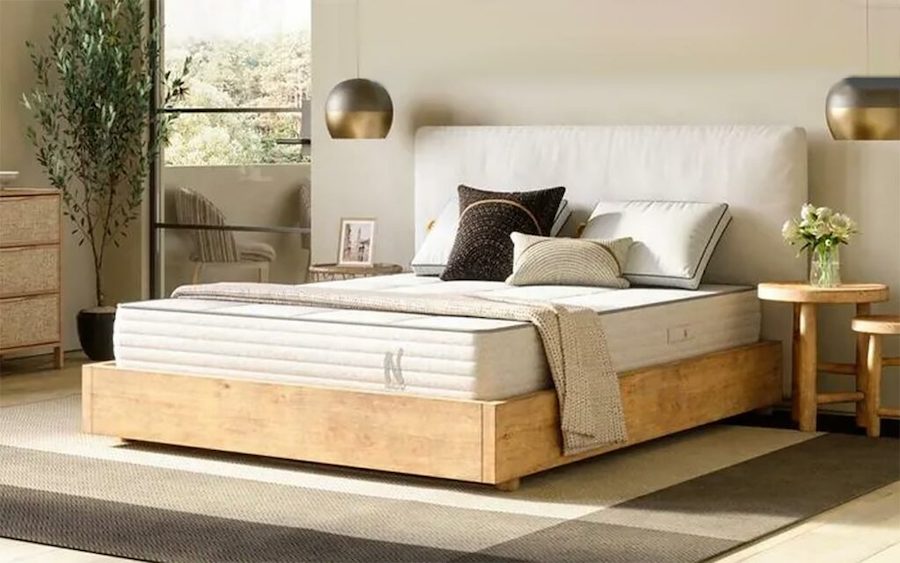
|
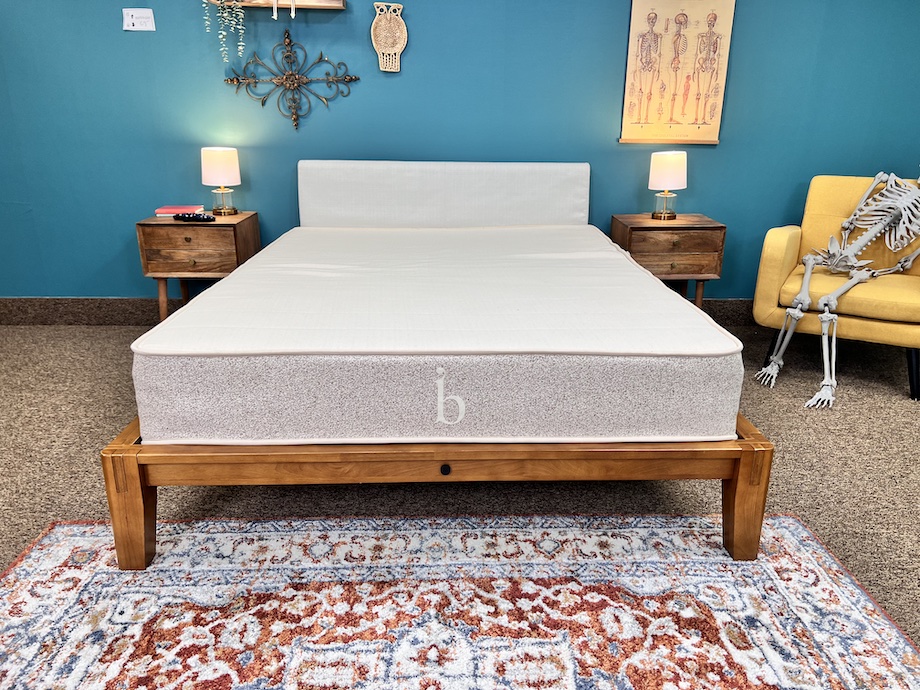
|
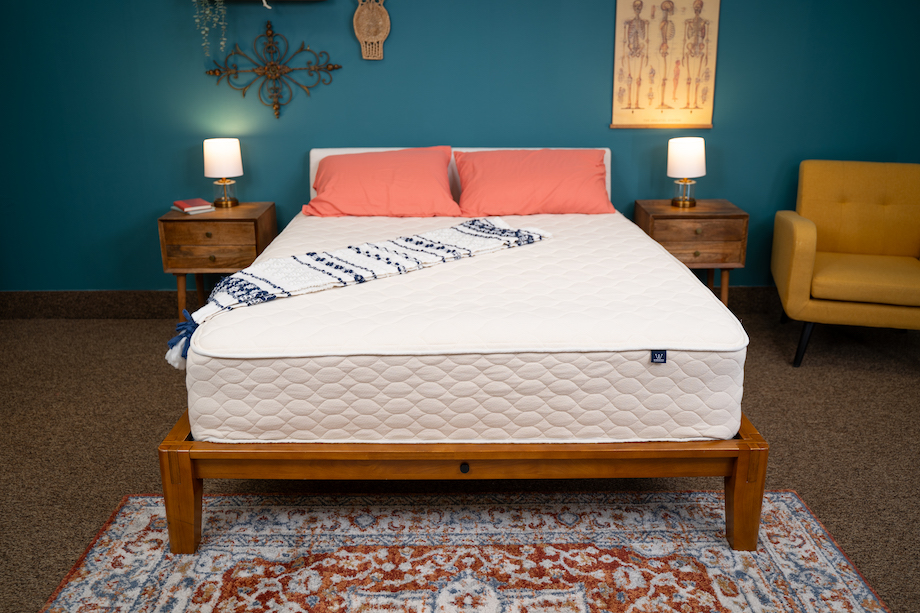
|
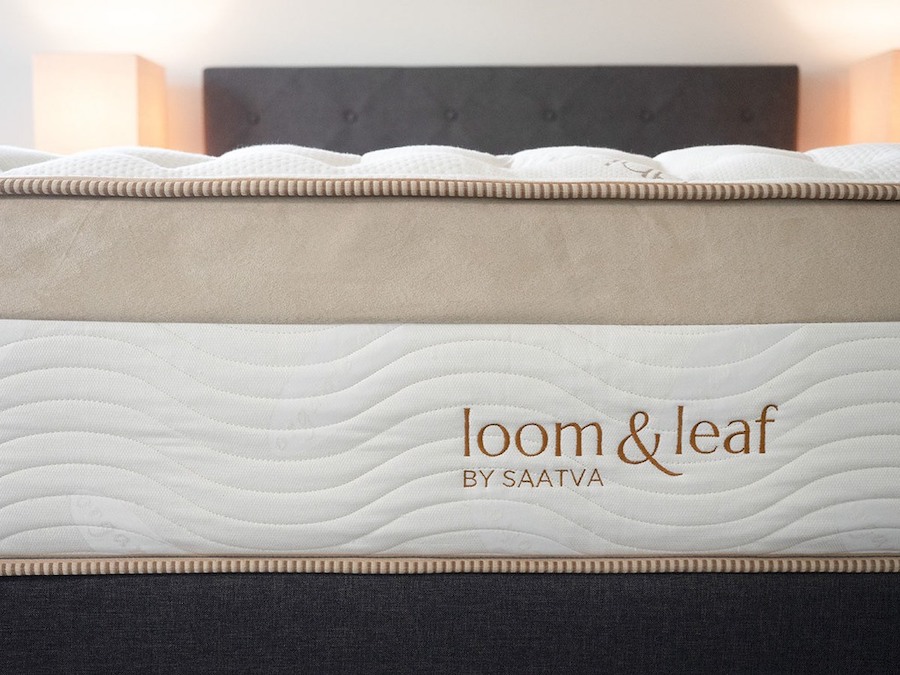
|

|
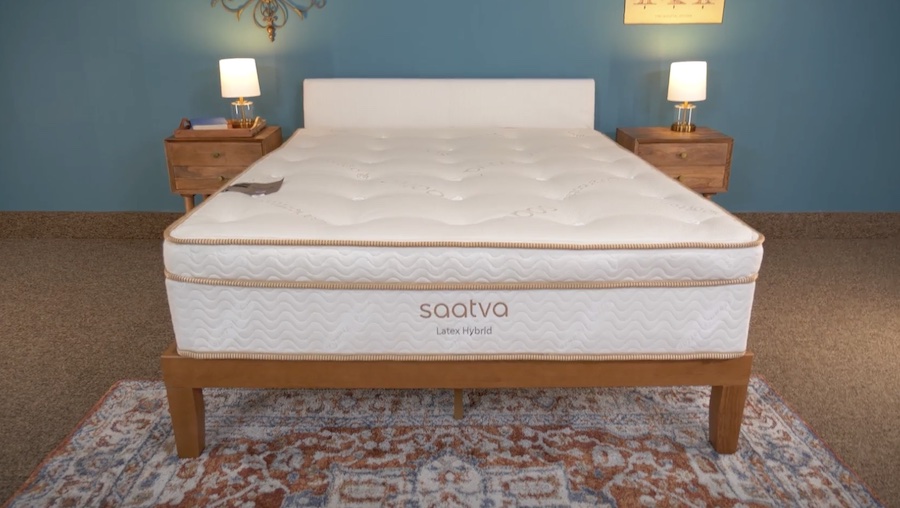
|
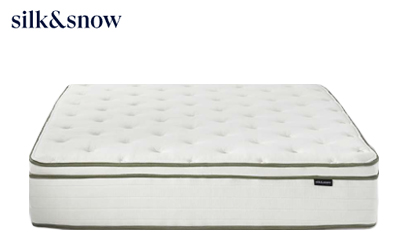
|
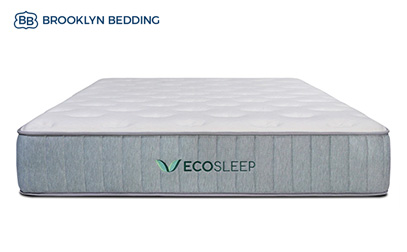
|
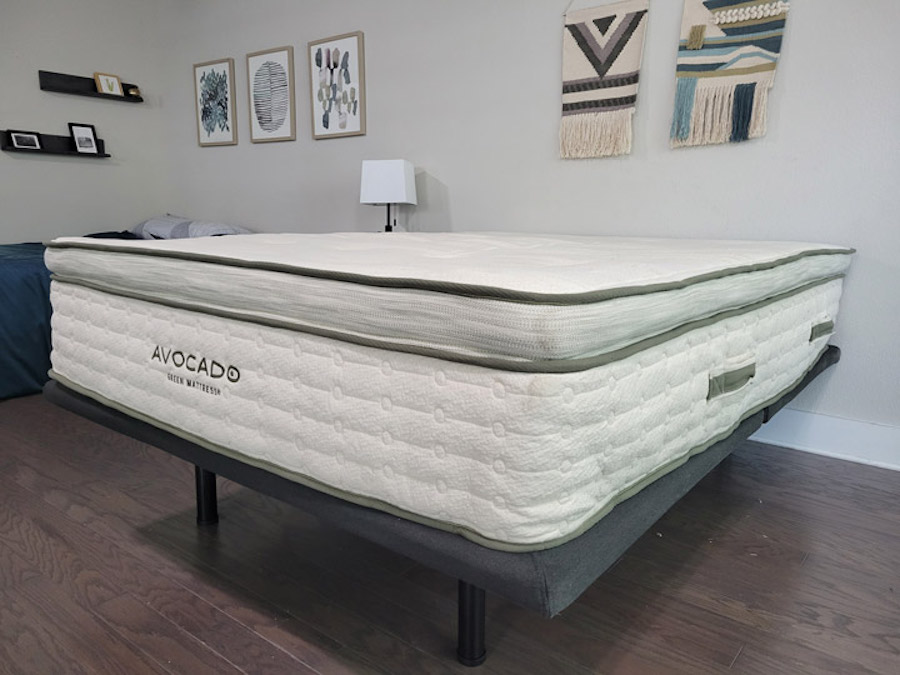
|
|
| Nolah Natural Mattress | Birch Natural Mattress | WinkBeds EcoCloud Mattress | Loom & Leaf Mattress | Bear Natural | Saatva Latex Hybrid Mattress | Silk & Snow Organic Mattress | Brooklyn Bedding EcoSleep | Avocado Green Mattress | |
| Rating | |||||||||
| Firmness | Medium-firm: 6/10 | Medium-firm: 6/10 | Medium: 5.5/10 | Multiple firmness options | Firm: 7/10 | Medium-firm: 6.5/10 | Multiple firmness options | Medium-firm: 6.5/10 | |
| Material | Latex | Hybrid | Latex | Foam | Latex | Latex | Latex | Latex | Hybrid |
| Cooling | — | — | |||||||
| Warranty | |||||||||
| Shipping | |||||||||
| Trial Period | |||||||||
| Best For | Side Sleepers, Back Sleepers, Stomach Sleepers, Hot Sleepers, Back Pain | Back Sleepers, Stomach Sleepers, Hot Sleepers, Seniors | Side Sleepers, Back Sleepers | Back Sleepers, Stomach Sleepers, Couples | Hot Sleepers | Side Sleepers, Back Sleepers, Stomach Sleepers, Hot Sleepers, Back Pain | Back Sleepers, Hot Sleepers | Back Sleepers, Stomach Sleepers, Hot Sleepers | Back Sleepers, Stomach Sleepers, Hot Sleepers |
Watch Our Video Review of The Best Organic Mattresses

What We Look for in an Organic Mattress
Natural Components
A lot goes into ensuring any good is made organically, and the same goes for mattresses. We made sure that these beds had a good percentage (if not 100%) of natural and/or organic materials used in its construction. Whether it’s organic wool, cotton, or latex, we want to see them in more than one spot (i.e., not just a cover tacked on at the end).
Certified Safe and Sustainable
Alongside ensuring a bed is organic is that it’s both safely and sustainably produced. Some synthetic (and even some natural) materials can cause things like harmful emissions or act as irritants to the skin. We looked for mattresses that have certifications from organizations like OEKO-TEX® and the Global Organic Latex Standard (GOLS) that ensure materials meet safety and sustainability standards.
Durability
Organic beds cost a lot, since a lot more goes into them than your average bed. So you want them to be an investment worth the high-price tag. We tried to pick beds that’ll last you a long time.
Best Organic Mattresses, Reviewed
Nolah Natural – Editor’s Pick

Nolah Natural Mattress

Product Details
Our Recommendation
Financing Options
Financing options are available for this mattress.
The Nolah Natural is one of the best out there if you’re looking for a high-quality, organic bed. This latex hybrid bed offers pressure relief and spinal support, making it an excellent choice for most sleepers, but especially those who put a lot of weight on their hips and shoulders when they sleep.
In addition to the Talalay latex, the Nolah Natural is made with other eco-friendly materials, such as organic cotton and wool, and recycled steel coils. Shoppers looking for an environmentally friendly bed that will provide comfort and pressure relief should put the Nolah Natural at the top of their list, just as we put it at the top of ours.
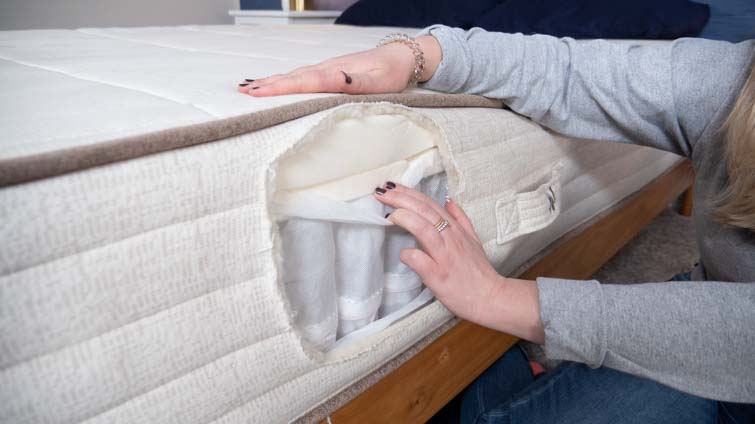
Birch Natural – Best All-Natural Organic Mattress

Birch Natural Mattress

Product Details
Our Recommendation
Financing Options
Financing options are available for this mattress.
The Birch Natural (from parent company Helix) features a comprehensive and all-natural design. It’s an organic hybrid mattress combining steel coils, natural latex, Birch wool, and organic cotton. Your body should feel supported and your spine aligned, all while this bed provides bounce for ease of movement.
The organic cover is a breathable surface on top of the Birch wool that draws the heat away from the body. The Talalay latex helps regulate the temperature of the other layers, preventing the mattress from overheating.

EcoCloud by WinkBeds – Best Eco-Friendly Latex Mattress

WinkBeds EcoCloud Mattress

Product Details
Our Recommendation
Financing Options
Financing options are available for this mattress.
The EcoCloud by WinkBeds features sustainably tapped, hypoallergenic Talalay latex, and a quilt cover made from 100% organic cotton and New Zealand wool. The innerspring system beneath the latex layer is zoned to improve support, keeping your body aligned to help with back pain.
These coils also give the mattress some bounce while promoting airflow and cooling, and they were made with the earth in mind: they’re recycled steel.
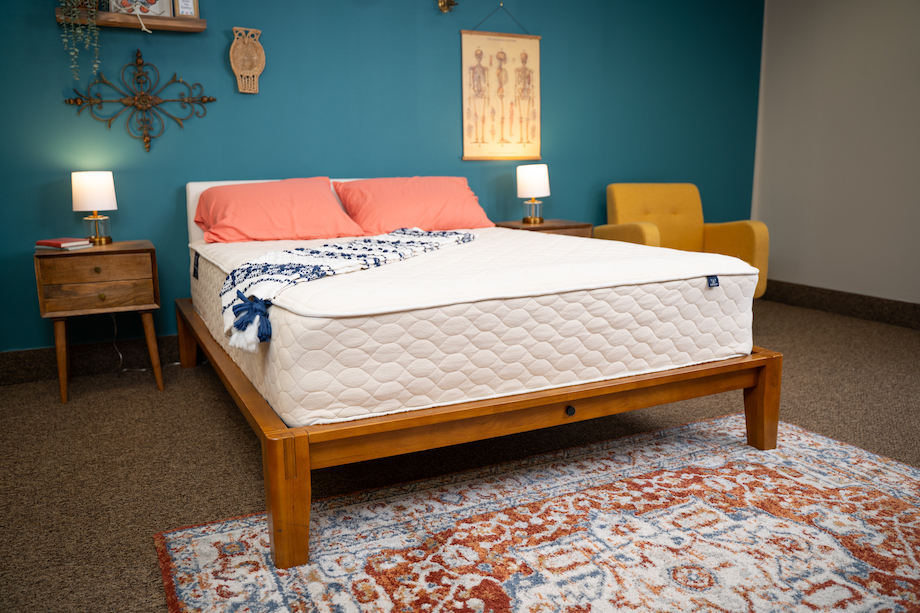
Loom & Leaf – Best Organic Cooling Mattress

Loom & Leaf Mattress

Product Details
Our Recommendation
Financing Options
Financing options are available for this mattress.
With Loom & Leaf, Saatva introduces a luxury memory bed designed to reduce heat retention. The cover is certified organic cotton woven together with thistle, which provides an all-natural flame retardant without dangerous treatments. The cotton was processed using the company’s exclusive Guardin® botanical treatment that inhibits the growth of bacteria.
The 3 inches of quality memory materials provide a cozy cradled feeling that should never leave you feeling stuck in the bed like some traditional memory foams can. Because the bed is never compressed into a box, its sustainable materials may benefit from increased durability.

Bear Natural – Best Organic Mattress for Side Sleepers

Bear Natural

Product Details
Our Recommendation
Financing Options
Financing options are available for this mattress.
The best beds for side sleepers have a balance of support and pressure relief. If you’re looking for an organic option, check out the Bear Natural. This is a new latex hybrid bed featured by Bear, a brand that consistently provides high-quality beds often tailored to athletes. But you don’t have to be an active person to enjoy the comforts of the Bear Natural.
The natural Talalay latex layer is where you’re getting the bulk of the bed’s pressure-relieving ability. The springs underneath keep up the support, and the GOTS-certified organic cotton cover is soft and breathable. Overall, it’s a great bed for side-sleepers who want an organic and natural product.
Saatva Latex Hybrid – Best Organic Mattress for Back Pain

Saatva Latex Hybrid Mattress

Product Details
Our Recommendation
Financing Options
Financing options are available for this mattress.
If you’re a dedicated organic mattress shopper with back pain, look no further than the Saatva Latex Hybrid. It has five unique zones in its natural latex layer, each engineered to support areas of the lower back, bolstered by a robust coil unit underneath.
The Saatva Latex Hybrid also earned high marks for motion transfer, responsiveness, and temperature control during our testing. We also found the edges to be solid and unlikely to buckle under your weight, thanks to the reinforced coils around the perimeter.
Overall, it’s a solid bed for a luxurious and
eco-friendly sleeping experience.
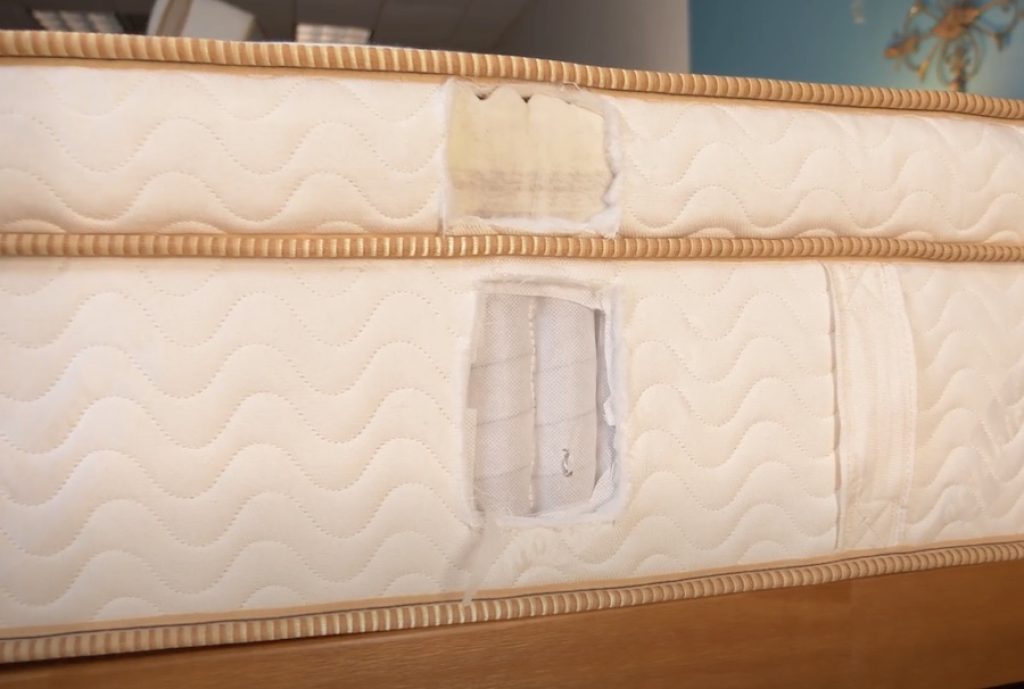
Silk & Snow Organic – Best Affordable Organic Mattress

Silk & Snow Organic Mattress

Product Details
Our Recommendation
Financing Options
Financing options are available for this mattress.
When it comes to choosing a mattress with organic and all-natural materials, quality materials and ethical sourcing can drive prices higher. That’s why we recommend the Silk & Snow Organic mattress if you’re still looking for an eco-friendly mattress at a more reasonable price. Before sales and coupons, a queen (of their firm model) will cost you $1,000—more approachable than some of the other mattresses on this list.
It even features GOLS-certified organic latex, GOTS-certified organic wool, and GOTS-certified cotton, all of which ensure that these materials come from the highest standards of eco-conscious and ethical production.
Brooklyn Bedding EcoSleep – Best Organic Mattress for Heavy People

Brooklyn Bedding EcoSleep

Product Details
Our Recommendation
Financing Options
Financing options are available for this mattress.
Some bigger bodies need more support, and it can be difficult to find any bed that can keep you lifted, let alone an organic option. There’s no need for any more searching, thanks to the Brooklyn Bedding EcoSleep.
This affordable latex hybrid features organic wool and cotton, and natural latex for an eco-friendly sleep surface. It has a firmer feel to ensure you won’t sink in, but the latex allows for pressure relief for added comfortability and responsiveness.
Avocado Green Mattress – Best Organic Firm Mattress

Avocado Green Mattress

Product Details
Our Recommendation
Financing Options
Financing options are available for this mattress.
With more certifications than you can shake a (green) stick at, the Avocado Green mattress was one of the first beds to prioritize eco-friendly, chemical-free components. We also found it to be a bracingly firm mattress—about a 7 out of 10 on our firmness scale.
Its primary comfort layer is made of Dunlop latex, which is bouncy and pressure-relieving even though it doesn’t slowly sink like memory foam. It gives the bed a very buoyant and taut surface, which is especially great for back and stomach sleeping.
Other Organic Mattresses We Tested
While these mattresses didn’t make our list, each of these organic beds are great fits for eco-conscious shoppers. Check out our featured recommendations below.
| PlushBeds Botanical Bliss | Eco Terra Mattress |
| Sealy Natural Hybrid Mattress | Latex For Less Organic Mattress |
What Is an Organic Mattress?
An organic mattress uses organic materials in its construction, such as organic latex, wool, and cotton. It should be manufactured without certain chemicals and without most pesticides.
Different materials have different standards for attaining organic status. Organic cotton, for example, cannot contain genetically modified organisms (GMOs). Organic wool must be derived from sheep that graze on pesticide-free pastures. As for latex, the rubber trees that provide the necessary sap have to be grown and harvested on plantations compliant with USDA organic regulations.
There’s no official way for a mattress to earn the “organic” label. That’s why it’s important to look into the makeup of a mattress you’re researching. Keep an eye out for certain certifications (more on those below) and be aware that there are subtle differences between them.
Can a Mattress Be Certified As Organic?
No. Currently, there’s no prominent organization that can holistically certify an entire mattress as organic.
When a mattress is marketed as organic, it usually means that certain materials inside it are certified as organic by a legitimate third-party organization.
Most commonly, these materials will be textiles certified by GOTS, such as organic wool and organic cotton, and/or latex foam certified by GOLS.
What to Look for in an Organic Mattress
When shopping for an organic mattress, it is important to consider that it is basically impossible to purchase a completely organic mattress. This is because some of the materials used in mattress construction, such as adhesives and hardware, can’t yet be manufactured to organic certification standards.
However, plenty of beds are made mostly of organic and sustainable materials that are void of pesticides and chemicals. Along with the materials, though, you should consider other important mattress qualities that can influence your experience with a mattress and whether it’s the right fit for your sleep style.
Advice from a Medical Expert
We reached out to Dr. Raj Dasgupta, who has over 20 years of experience in the medical field, to see his thoughts on what key qualities people should look for in an organic mattress.
“When you’re looking into organic mattresses, keep an eye out for legitimate certifications from trusted agencies, natural materials, no harmful chemicals, comfort and support, durability, breathability, and consider the price to make sure you’re getting a healthier and eco-friendly option.”
Type of Mattress
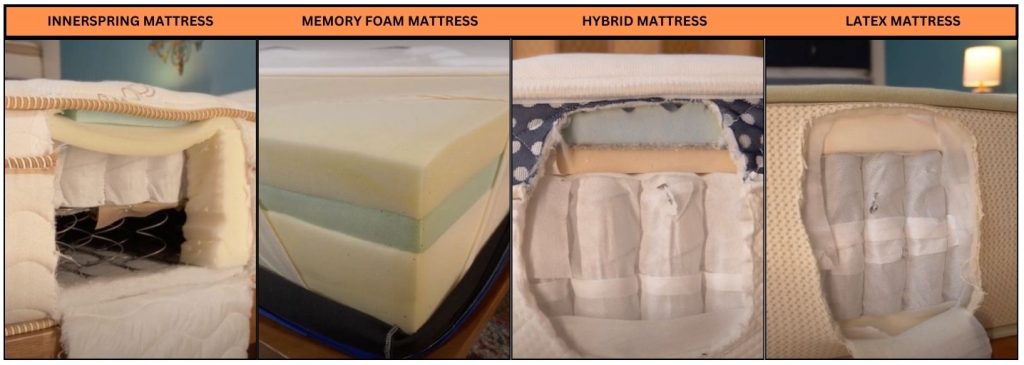
Innerspring Mattresses
Innerspring mattresses contain coils that provide support and bounce. These beds have been around the longest, so they’re considered a more traditional mattress style.
Innerspring mattresses may either contain interconnected coils that move together or pocketed coils that move more independently of one another for better motion isolation. The advantages of innerspring beds include a lower price tag, more bounce, and better airflow. However, these can sometimes break down more quickly and don’t offer as much pressure relief since they don’t have thicker foam layering.
Learn More: Top-Rated Innerspring Mattress
Hybrid Mattresses
As the name implies, a hybrid just means a combination of foam and innerspring designs. Typically, high-quality hybrid mattresses are known for providing the best features of both types of mattresses. For example, you get the soft, contouring properties of memory foam with the support and durability of a spring mattress.
Perhaps most notable is that you get more motion isolation because of the foam on the top (and sometimes the base layer as well). For people who sleep with a partner, you may want to have a top layer of foam to isolate their movements better. Otherwise, every time that person moves, it will create movement on your side of the bed that is bound to wake you up.
Memory Foam Mattresses
Memory foam is that magical material that allows you to place your hand imprint on the surface, and you can watch as the outline is still there. It is known for its contouring capabilities, meaning that when you lie down, the heavier parts of your body sink in and cradle you in all the right places. Memory foam’s soft, squishy surface results in one of the highest customer satisfaction ratings in terms of bedding.
However, memory foam is not a perfect solution for everyone. For one thing, it can tend to sleep hot because your body sinks into the surface, prohibiting airflow. Another issue is that memory foam is not natural or organic. In recent years, the demand for natural and non-toxic materials has inspired manufacturers to blend their beds with plant-based foams.
If you’re in the market for a bed made out of memory foam, check for certifications as beds made by less reputable manufacturers may contain flame retardants that make them ineligible for basic certifications.
Latex Mattresses
There are two general types of latex: natural, which is made from the sap of a rubber tree, and synthetic, which is petroleum-based. If you’re looking for a natural, chemical-free bed, you’ll want to look specifically for natural latex.
Whether it’s natural or synthetic, there are also two different types of processes that can be used to manufacture latex: Talalay or Dunlop.
In both processes, liquid latex is poured into a mold for freezing and setting. However, the Talalay process involves an extra step in which air cavities are left inside that are later vacuumed with air. The result is superior heat transfer, meaning you won’t get as hot when you sleep, but the tradeoff is less durability and usually a higher price.
Dunlop latex is an easier and simpler manufacturing process. The sap is placed in the mold, put in the vulcanization oven, and treated in much the same way, minus the vacuum process. As a result, it’s a less expensive and more environmentally friendly product.
You may occasionally see blended latex products that combine both natural and synthetic materials.
Other Considerations When Shopping for an Organic Mattress
Construction & Materials
Many eco-friendly beds will have a combination of natural latex with either a wool or cotton cover. Sometimes you’ll find both wool and cotton.
Wool is common because the sheep’s fur is covered with a natural wax-like substance that creates a moisture barrier that can help keep you cool.
More often than not, you’ll also find organic cotton. It’s naturally breathable and absorbs moisture.
Some natural beds also use a coil construction of premium metals that are often recycled for a sustainable and eco-friendly product.
Certifications
We recommend always checking which certifications a mattress has but also use some healthy skepticism. For example, if something is certified as organic, is it the entire bed or just a certain layer?
Also, keep in mind that not all certifications apply to all products. An example of this is the Global Organic Latex Standard (GOLS), which only applies to mattresses made from latex, not other materials.
A final thing to look for when it comes to certifications is an expiration date. Just like elevators require constant inspections to ensure safety, organic certifications must be renewed, often yearly. If a certification is expired, it could mean that the company originally used organic materials and then switched to non-organic inputs.
Sleeping Position
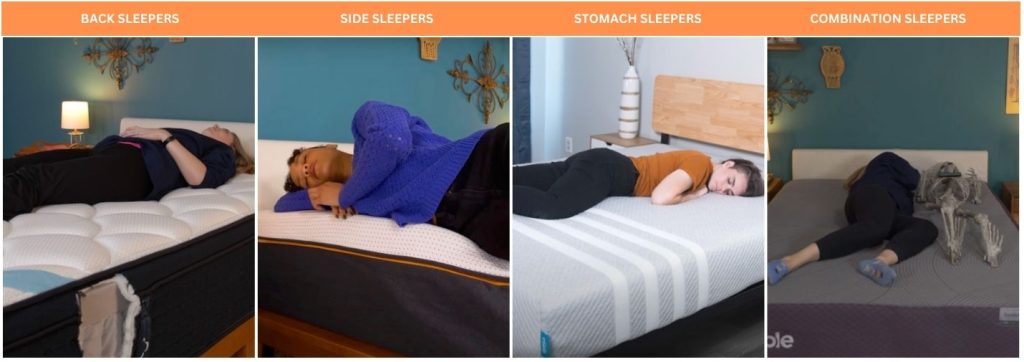
You should consider the position you sleep in when purchasing a mattress. This is because different positions respond better to different materials and firmness levels.
Side sleepers typically rest best on soft to medium-firm mattresses. These sleepers should look for a mattress with enough plushness to gently contour around the hips and shoulders and enough firmness to support overall spinal alignment.
If you prefer to sleep on your stomach, you will likely want a reasonably firm mattress to keep your hips elevated. If the midsection is allowed to sink too far into the mattress, it can put the spine in an awkward and uncomfortable position. Firm mattresses will help keep stomach sleepers lifted and aligned.
Back sleepers usually need the solid support of a medium-firm mattress. They should also consider beds that relieve pressure, particularly around the lower back.
Sleepers who change positions throughout the night typically need a versatile and adaptable mattress. These sleepers may gravitate towards medium-firm latex or hybrid mattresses that support them while being responsive enough for frequent movements.
Explore: Best Medium-Firm Mattresses
Weight/Body Type of Sleepers
How much you weigh can considerably impact the type of mattress that works best for you.
Lighter people generally prefer soft, plush beds that gently contour around their bodies and provide ample pressure relief. This type of bed allows them to sink further into their mattress and avoid the pressure buildup that happens when lightweight sleepers sleep on firmer beds and bear all their weight on the small joints of the body.
Average-weight sleepers, which are those between 130 and 230 pounds, usually need a bed in the middle of the firmness scale. These mattresses provide support and comfort by keeping sleepers’ spines aligned while also delivering pressure relief.
A firm, durable mattress will likely serve you best if you’re a heavyweight sleeper. Heavier people can push through the layers of a soft mattress too quickly, which can cause pressure buildup and an awkward spinal alignment.
Learn More: Best Mattress for Petite Sleepers and Best Mattress for Heavy People
Firmness
Whether a mattress is on the natural or synthetic spectrum, you should be able to find the ideal firmness level. The firmness of a bed refers to how hard or soft it feels when you lie on it. We rate mattress firmness on a 1 through 10 scale, in which 1 is the softest and 10 is the firmest. Most beds fall within the medium to medium-firm range, though some are slightly softer or firmer than this.
When it comes to eco-friendly latex, Dunlop latex is often more firm than Talalay, which may influence the overall feel of a mattress. In the event your mattress ends up being too hard, you can always get an organic mattress topper to soften things up for you.
Read More: Mattress Firmness Guide
Cooling
Staying cool throughout the night can increase your chances of getting quality sleep. Therefore, when shopping for a cooling mattress, you’ll want to be mindful of the materials and beds that can prevent overheating.
Traditional innerspring and hybrid mattresses usually score high in temperature regulation categories. The coils used in the construction allow air to circulate more easily. Latex beds are also excellent for keeping sleepers cool because this material has an open-cell structure, which allows for significant airflow.

Memory foam beds are typically the warmest. This dense material has tiny pores that trap air, which can allow heat to build up. However, many manufacturers have heeded the heat complaints, and new memory foam models are often made with cooling gels or other alternative cooling features.
Motion Isolation
A mattress’s ability to absorb motion is essential for couples and co-sleepers. If a bed doesn’t isolate the motion made by a sleeper’s tossing or turning, it may disturb their partner.
Memory foam is usually best at this because it absorbs motion well, but it’s also not the most eco-friendly option compared to organic or natural latex. If you want to stick with memory foam for its motion isolation, look for memory foam beds that are CertiPUR-US®, as these are going to be safer and more environmentally friendly.
If you and your partner want a bed with coils, avoid traditional innerspring beds and instead go with a hybrid with pocketed coils as these are better for motion isolation.
Sex
Sexually active couples are likely to enjoy beds that are responsive and bouncy. These characteristics allow for easier movement and repositioning so that you and your partner won’t feel stuck in the mattress. Coils, like the ones found in innerspring and hybrid mattresses, can provide buoyancy, and latex mattresses typically have excellent responsiveness. Shop the best beds for sex here.
Pressure Relief
Body parts, such as the shoulders, lower back, and hips, that come in contact with the mattress throughout the night can often experience pressure buildup. Mattresses that relieve pressure well typically have materials that can cushion and contour the sleeper’s curves so that pressure doesn’t accumulate.
Memory foam is renowned for this, but latex is no slouch either, especially softer Talalay latex. Pressure relief is important for all sleepers, but it’s especially vital for side sleepers since their weight accumulates in a smaller area.
Find more mattresses for pressure relief.
Edge Support
Although edge support may not seem essential, it can greatly enhance your sleep space. Edge support is the amount of resistance your bed provides around the perimeter. If it sags, it can make it difficult to get out of bed; this can be particularly problematic for those with back pain or mobility issues.
Solid edge support also allows you to utilize the entire mattress surface when you sleep. This can be beneficial if you share your bed with a partner or pet. Innerspring and hybrid beds’ coils usually have good edge support, and in foam mattresses, manufacturers often put higher-density foam around the edges to shore up the perimeter.
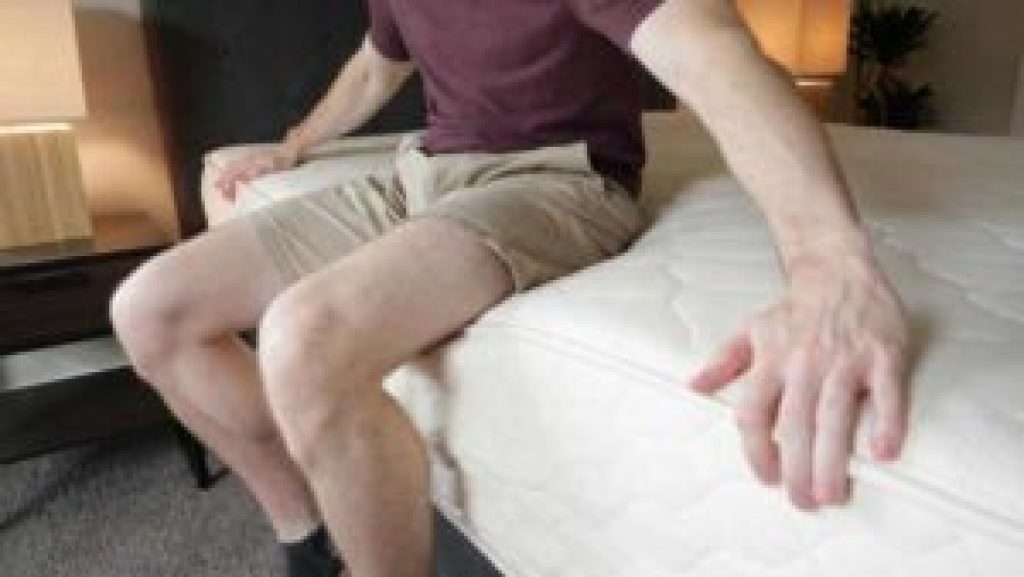
Budget
Setting a budget you’re comfortable with should be one of the first steps you take when mattress shopping. This will allow you to narrow down your choices, and it may prevent unnecessary financial stress. It should be noted that organic mattresses are typically more expensive than ones made with synthetic materials. However, there are still plenty of affordable options in this category.
Also, cheaper mattresses don’t necessarily mean they are inferior products. With direct-to-consumer trends, many high-end beds now come at a lower cost. To help you save money, we recommend shopping during major sales holidays since companies will cut mattress prices even more.
Explore our picks for high-quality budget mattresses.
What Are the Benefits of an Organic Mattress?
“Transitioning to an organic mattress can genuinely impact your sleep and well-being. With fewer chemicals and more natural materials, it’s a smart choice that can boost sleep quality and decrease allergic reactions, leading to a more restful night.”
Dr. Raj Dasgupta
Understanding Different Mattress Certifications
CertiPUR-US® Certified
This certification is for poly or memory foam products, including mattresses, mattress toppers, pillows, and upholstered furniture. The process tests for product content, emissions, and durability.
If a bed is CertiPUR-US® certified1, this means that levels of the following chemicals are acceptably low:
- Ozone depleters (like CFCs – chlorofluorocarbons)
- Chemical fire retardants
- Formaldehyde
- Mercury, lead, or heavy metals
- Phthalates
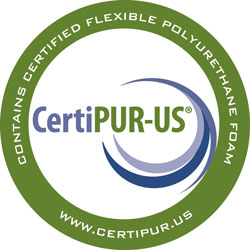
They also limit the amount of VOCs, or volatile organic compounds, that can be present. This precaution is to ensure better air quality. However, it should be noted that can be up to 0.5 parts per million, enough to cause a familiar, and slightly obnoxious, off-gassing smell.
Most beds in the United States, organic or not, will come with a CertiPUR-US® certification. We recommend that even if you decide not to get a natural bed, you at least look for something with this certification.
OEKO-TEX® Certification
The OEKO-TEX®certification2 is a global certification for textile products. It examines every stage of production, from the raw materials to processing, to finished goods. For mattresses and bedding, the materials that would be certified include yarns, fabrics, buttons, zippers, threads, and labels.
This certification became necessary as our global economy meant that parts of a finished good were manufactured in numerous countries. Each country often has different standards and regulations, so being able to hold every component of an item to the same standard became imperative for safety.
Like CertiPUR-US® standards, the OEKO-TEX® certification ensures that there is no formaldehyde and heavy metals. It also goes a step further by barring this distinction for other chemicals that they deem harmful, even if there are no legal regulations barring their use.
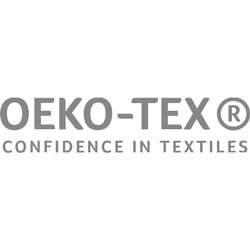
As companies shift sourcing and production, consumers may wonder if a product is OEKO-TEX® compliant. Like most certifications, this one also has a finite period in which it is valid. The certificate is valid for a 12-month window, and within that time, manufacturers can be audited for compliance at any time.
Organic Exchange
This certification is commonly abbreviated to OE-100 and OE-Blended. Starting in 2014, they’ve been phasing this out and replacing it with something called the Organic Content Standard, or OCS.
The difference between OE-100 and OE-Blended has to do with the amount of organic fiber that’s in the item. For something to be compliant with an OE-100 certification, it would need to be made with 100 percent organic fiber material.
The Blended distinction means that there can be a host of other materials, including non-organic ones, and there only needs to be 5 percent organic cotton to qualify.

Unlike the first certifications mentioned, Organic Exchange doesn’t track or deal with chemicals, environmental safety, or social issues (like child labor, fair wages, or safe working conditions). Instead, the focus is solely on the integrity and purity of the material and whether it maintains this classification through each step of the production process.
Global Organic Textile Standard (GOTS)
The Global Organic Textile Standard3 (GOTS) addresses the environmental and human aspects of textile production. The idea is to make sure that materials maintain organic integrity from harvest to production, and every step in between.
The minimum threshold to qualify for this certification is 70 percent organic fiber, which begs the question of what the other 30 percent contains. The production facility must also have a wastewater treatment plant that is fully operational if they’re doing anything that requires wet processing.
To become certified, a textile manufacturer is subject to an in-depth inspection, which includes checking for the integrity and isolation of organic vs. non-organic materials, an inspection of all dyes and chemicals, interviews with workers to ensure fair treatment and safety standards, and the testing of random samples for compliance.
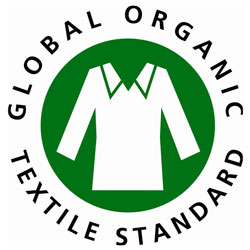
For those consumers concerned about worker safety and treatment, it can be reassuring to know that there is a third-party organization testing for these qualities.
Eco-Institut Certification
The Eco-Institut is a German company4 that focuses on emissions testing. Mattress off-gassing, which is that new mattress smell you might sometimes encounter, can be bothersome for those sensitive to smells. The Eco-Institut tests the composition of these emissions and will certify only products that are safe.
The company has more than 90 test chambers, and they’ll run a mattress through rigorous testing before granting certification. They test for the following:
- Harmful emissions
- Environmental pollutants
- Presence of heavy metals
- Use of flame retardants and phthalates
- Overpowering odors
- Durability
- Visual quality inspection
- Toxic load and ecological impact
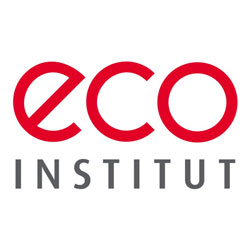
If a company applies for certification and fails, the Eco-Institut will work with them to help get their product up to par. If you’re concerned about off-gassing, look for this certification.
USDA Organic Certification
There’s no official USDA certification5 for mattresses because the USDA only certifies inputs like food, plants, and certain materials. However, a mattress that contains wool, cotton, or latex can be certified for those specific materials.
There are three different USDA certifications:
- 100 percent organic: all of the ingredients are organic
- Organic: 95 percent or more of the inputs meet this standard
- Made with organic (insert material here): if the makeup of an item is at least 70 percent, it can get this classification.
Since cotton is a controversial crop due to pesticides and GMOs, look for an organic label if you’re buying a mattress that has cotton in it.
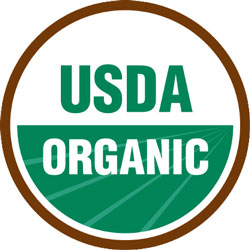
GREENGUARD Gold
The GREENGUARD Gold certification6 is one of the more stringent and difficult to get. It’s designed to protect sensitive individuals like children and the elderly from exposure to chemicals and gasses that can cause allergic reactions.
It severely limits the amount of volatile organic compounds (VOCs) that can be present in a product. If you’re buying a crib mattress or a bed for a toddler, this certification should be a requirement.
Something that makes this certification particularly trustworthy is that they evaluate both the elements and the product as a whole. The reason that this is important is that often a single material may contain emission-producing qualities that on their own aren’t harmful or over the threshold. However, if combined with other products, it can put the finished item over the top.
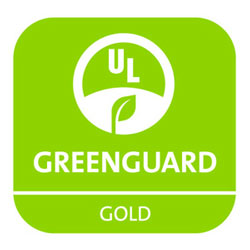
You may see a certification called “GREENGUARD” that is missing the Gold part of the certification. Be aware that this certification is not as stringent. While it requires low emissions to be compliant, there can be significant off-gassing for up to 14 days, and the product will still be certifiable.
Cradle to Cradle
One of the most stringent and trusted certifications is the Cradle to Cradle Certified Product Standard7. It looks at five product categories:
- Material health – for both human and environmental health
- Material reutilization – a percentage of components that are renewable, recycled, and recyclable
- Renewable energy and carbon management – either use renewable energy or offset carbon emissions in another way
- Water stewardship – maintain the integrity of community water supply
- Social fairness – treat employees well and make a positive impact on the community
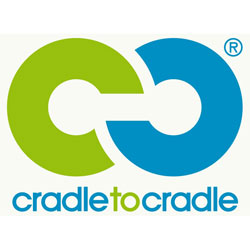
Each category gets a rating of either basic, bronze, silver, gold, or platinum. Then, whichever one receives the lowest mark is the certification that the product will have on the label. For example, if a mattress gets Platinum in almost every category, but is rated bronze in water stewardship, then the product would get bronze.
Within this organization, the certification board also looks to see if the company is engaged in Continuous Improvement efforts. There’s also a check to ensure that none of the components are on the Banned Chemicals List8. If any of those materials are present, the product is automatically disqualified from the certification process.
Global Organic Latex Standard (GOLS)
Also known as GOLS, the Global Organic Latex Standard9 is specifically designated for latex products. It evaluates the integrity of both organic and non-organic materials. In order to be certified by GOLS, the percentage of organic material must exceed 95 percent.
As latex is experiencing a resurgence in popularity, this certification is designed to ensure the safety and sustainability of the products being produced. The parent company that came up with this certification, Control Union, has its roots in agriculture. Since natural latex is a natural product sourced from a rubber tree, it made sense to expand the umbrella of certification programs to this material as well.
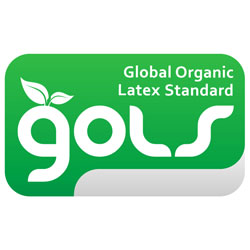
The leadership team at Control Union believes that consumers should vote with their dollars, and by purchasing products that meet strict quality and environmental standards, they’re signaling the importance of these values to manufacturers.
Other Eco-Friendly Mattress Tips
Donate or Recycle Your Old Mattress
To keep old mattresses from taking up space in landfills or to give them to someone in need, you can donate or recycle them. If your mattress is free of stains, odors, rips, tears, and bed bugs, many charitable organizations will take them.
The non-profits that will take old mattresses vary depending on location, but you can check with women’s and homeless shelters, Habitat for Humanity, The Salvation Army, a Bedder World, Furniture Bank Network, Donation Town, and non-profit thrift stores.
To keep mattresses from landfills, the Mattress Recycling Council (MRC) is developing innovative ways to recycle them. Some mattress companies will recycle your old mattress according to state laws if you purchase a new one from that company. Earth 911 is also a good source for instructions on recycling your mattress.
Further, there are several ways to use the materials from a mattress for home projects, such as:
- Building a compost bin out of the wooden slats
- Making a wine rack or plant holders out of the innerspring coils
- Using the foam for outdoor seat cushions, pet bedding, soundproofing, or toy blocks
More: How to Dispose of a Mattress
Buy Organic Bedding
Organic bedding is an additional way to make your sleeping environment environmentally friendly. You can look for sheets, comforters, and pillows made of organic cotton or bamboo. These sheets will be free of harmful chemicals. Further, organic cotton is a lower-impact crop than conventional cotton, and bamboo plants are entirely regenerative.
Best Organic Mattress FAQs
Why are organic mattresses so popular?
In a world of ever-increasing toxins and environmental pollutants, we often seek out natural solutions that are non-toxic and chemical-free. Also, because we spend so much of our lives in bed, organic beds are one of the easiest ways to reduce our toxic load.
Organic bedding is also considered hypoallergenic, and since asthma and allergies can interfere with sleep, it makes sense to consider an organic mattress in this case.
If you want to learn more, check out our in-depth analysis of hypoallergenic beds.
Why do organic beds cost more?
You’ll probably pay more for an organic bed, but why? There are a few reasons that the price tag is higher:
- Rarer materials: Organic cotton, for example, is not produced at the same volume levels as conventional cotton, which drives the price up.
- More careful processes: Many steps are done by hand or take extra effort.
- Social responsibility: Organic bedding companies sometimes pay higher wages, which get passed on to the final product.
Vendor compliance: To receive organic certifications, manufacturers can only source their items from select vendors, again driving up the cost.
What’s the difference between an organic, non-organic, and eco-friendly bed?
The first thing we should point out is to watch for fluff words like “eco-friendly” that have no official certifications or criteria attached to them. Any company can say eco-friendly, especially if there is a single component of the bed that is natural.
Organic and non-organic are a little easier to decipher. It simply means that one is made of a certain percentage of organic materials, while the other is not. A non-organic bed will typically contain chemicals, including fossil fuels, while that is not allowable in an organic mattress.
Which types of mattresses can be organic?
Latex mattresses, hybrid mattresses, and innerspring mattresses can all be made with organic materials and marketed as organic mattresses. All-foam mattresses don’t bill themselves as organic, because foams are synthetic materials that can’t meet the standards set for an organic certification.
It’s important to note that different materials have different standards for being labeled organic. Cotton, for example, has to meet different qualifications than wool before it earns the organic label. The most common materials that can be billed as organic and found inside mattresses are wool, cotton, and latex. However, some mattresses are branching out and incorporating organic materials such as coconut fiber and cashmere.
How do you pick a non-toxic mattress?
Look for mattresses that have certifications from trustworthy organizations, such as the Global Organic Textile Standard (GOTS), Global Organic Latex Standard (GOLS), OEKO-TEX®, and GREENGUARD Gold. The first two certifications speak to the presence of organic materials in the mattress, whereas the second two attest that the mattress doesn’t contain specific harmful chemicals or release dangerous emissions.
If the mattress you’re considering has foam in it, make sure the foam is CertiPUR-US® certified. This certification means that the foam meets high standards regarding its ingredients, emissions, and durability.
From there, assess the mattress’s other qualities. Does it have the features you’re looking for in a bed? Rank the available bells and whistles in terms of your personal sleeping priorities, and choose the best non-toxic mattress that hits your must-haves.
Are organic mattresses healthier for you than other mattresses?
In some cases, yes. Organic mattresses don’t contain or emit the harmful substances that some non-organic, lower-quality mattresses do. Additionally, an organic mattress might be especially beneficial to someone who is sensitive to certain chemicals or who prefers to buy all-natural products.
That being said, non-organic mattresses are not inherently unhealthy. Many of them pass rigorous tests to prove that they’re safe for sleepers and garner certifications from places like CertiPUR-US® so buyers can rest easy. Whether or not an organic mattress is a healthy choice for you will depend on your needs and preferences.
Are organic mattresses safe for kids and babies?
If you have a kid or baby, an organic mattress is your best choice. Look for one that is GREENGUARD Gold certified, as that is the highest certification for infant bedding. One thing to be extra cautious about is the firmness level, especially for infants.
If a baby is not fully mobile yet, meaning they can’t roll over on their own, the risk of suffocation increases, so avoid the temptation to buy a soft and fluffy bed for your infant.

Julia Forbes
Lead Product Tester
About Author
Julia is the Lead Reviewer at Sleep Advisor, specializing in testing out mattresses and sleep accessories – she’s in the right line of work, because she loves to sleep.
Stomach Sleeper
Education & Credentials
- Certified Sleep Science Coach
